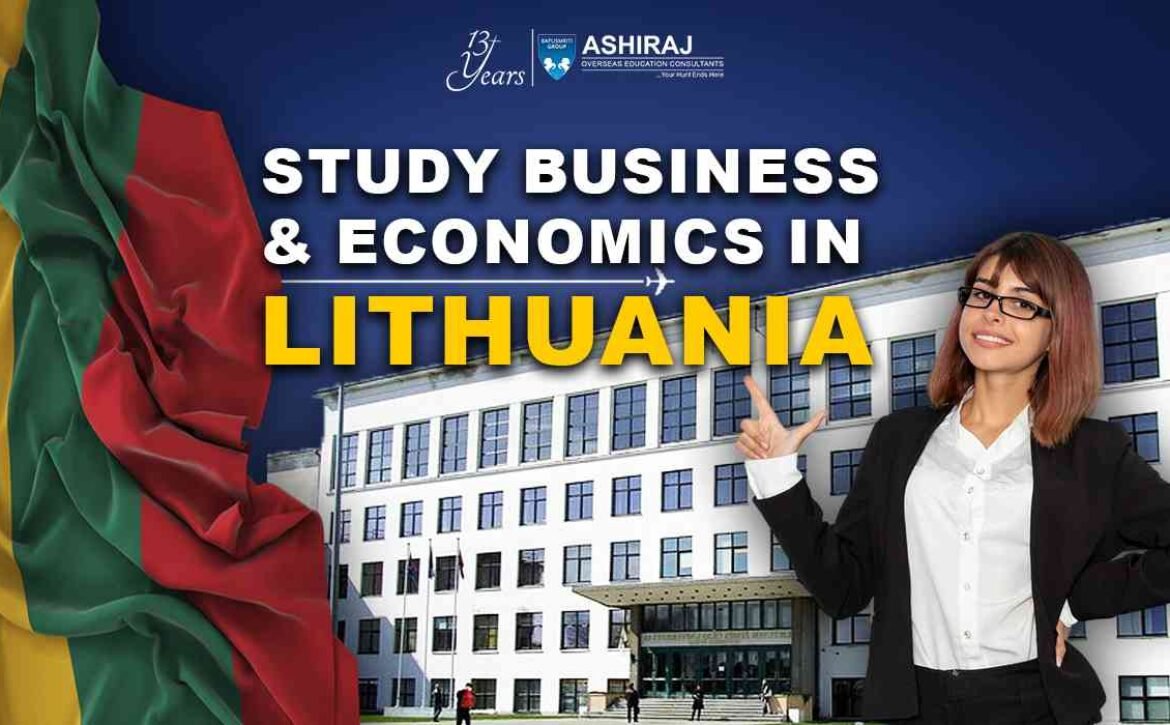
Business and Economics in Lithuania
Exploring the vibrant landscape of Business and Economics in Lithuania unveils a dynamic amalgamation of tradition and innovation within the Baltic region. Lithuania, nestled at the crossroads of Eastern and Western Europe, presents a compelling narrative of economic resilience and growth post its independence from the Soviet Union in 1990. With a strategic geographical location and a skilled workforce, Lithuania has emerged as a beacon of opportunity for international investors and entrepreneurs seeking entry into the European market.
The business climate in Lithuania is characterized by a robust infrastructure, favorable regulatory frameworks, and a burgeoning startup ecosystem, making it an attractive destination for foreign direct investment. From traditional sectors like agriculture, forestry, and manufacturing to burgeoning industries such as fintech, biotechnology, and ICT, Lithuania offers a diverse array of investment opportunities. As the country continues to prioritize innovation and sustainability, Business and Economics in Lithuania stand poised at the cusp of transformative growth, solidifying its position as a key player in the European economic landscape.
Why to Study Business and Economics in Lithuania?
- Strategic Location: Lithuania’s strategic position at the crossroads of Eastern and Western Europe offers students exposure to diverse business environments and cultures, providing invaluable global perspectives.
- Growing Economy: With a rapidly growing economy post-independence from the Soviet Union, Lithuania presents abundant opportunities for students to witness firsthand the dynamics of economic development and innovation.
- Favorable Business Environment: Lithuania boasts a favorable business environment characterized by low corporate tax rates, streamlined regulations, and government support for entrepreneurship, making it an attractive destination for aspiring business professionals.
- Thriving Startup Ecosystem: The country’s burgeoning startup ecosystem, particularly in sectors like fintech and biotechnology, offers students the chance to engage with cutting-edge technologies and entrepreneurial ventures.
- Quality Education: Lithuania is home to several prestigious universities offering top-notch business and economics programs taught by renowned faculty members, ensuring a high-quality education that equips students with the skills needed to succeed in the global marketplace.
Studying Business and Economics in Lithuania not only provides students with a solid academic foundation but also offers unparalleled opportunities for personal and professional growth in a dynamic and forward-thinking environment.
Top Universities to Study Business and Economics in Lithuania
University | QS World University Rankings 2023 | Type of University | Average Annual Fees | Programs Offered |
Vilnius University | 501-510 | Public | €1,000 – €3,000 | Bachelor’s, Master’s, and PhD in Economics and Business |
Kaunas University of Technology | 601-650 | Public | €1,000 – €3,500 | Bachelor’s and Master’s in Business Administration, Economics |
ISM University of Management and Economics | 801-1000 | Private | €4,000 – €7,000 | Bachelor’s and Master’s in Business Administration, Economics, Finance |
Vytautas Magnus University | 1001+ | Public | €1,000 – €3,500 | Bachelor’s and Master’s in Economics, Business Management |
Klaipėda University | 1001+ | Public | €1,000 – €3,000 | Bachelor’s and Master’s in Economics, International Business |
Exploring the top universities in Lithuania for Business and Economics reveals a diverse array of institutions renowned for their academic excellence and innovative programs. These universities provide a range of undergraduate and postgraduate degrees tailored to meet the demands of the dynamic business landscape. With affordable tuition fees and a variety of programs offered in English, international students seeking quality education in Business and Economics in Lithuania have ample choices to consider.
Course Curriculum for Business and Economics in Lithuania
- Comprehensive Core Courses: The course curriculum of Business and Economics in Lithuania typically includes a solid foundation in core subjects such as economics, finance, accounting, and management, providing students with a well-rounded understanding of key business principles.
- Specialized Electives: Students have the opportunity to tailor their education according to their interests and career goals through a wide range of specialized elective courses. These may include areas such as international business, marketing, entrepreneurship, and business analytics, allowing for a deeper dive into specific domains within the field.
- Practical Experience: Many programs incorporate hands-on learning experiences, such as internships, case studies, and real-world projects, to bridge the gap between theory and practice. This practical exposure equips students with the skills and knowledge needed to thrive in today’s competitive business environment.
- Focus on Innovation: With Lithuania’s growing reputation as a hub for innovation and technology, many programs integrate coursework on innovation management, digital business, and entrepreneurship, preparing students to navigate and lead in an increasingly digital and innovative economy.
- Global Perspective: Given Lithuania’s strategic location and its emphasis on internationalization, Business and Economics programs often incorporate coursework on global business trends, cross-cultural management, and international economics, ensuring students graduate with a broad global perspective and the ability to thrive in diverse business environments.
Eligibility Criteria & Admission Requirements for MS in Business and Economics in Lithuania
- Language Proficiency: Applicants are typically required to demonstrate proficiency in English through standardized tests such as the International English Language Testing System (IELTS) or the Test of English as a Foreign Language (TOEFL). Minimum scores for IELTS are 6.5 overall with no band less than 6.0, while for TOEFL, a minimum score of 80 is usually required.
- Standardized Tests: Depending on the university and program, applicants may need to submit scores for either the Graduate Record Examination (GRE) or the Graduate Management Admission Test (GMAT). For GRE, a competitive score would be around 310-320, and for GMAT, a score of 600 or above is often required.
- Documentary Requirements: Applicants must provide essential documents such as a valid passport, academic certificates (including transcripts and diplomas), and proof of any relevant work experience, if required by the program.
Requirement | Minimum Marks/Score |
IELTS | Overall 6.5, no band less than 6.0 |
TOEFL | Minimum 80 |
GRE | 310-320 (approximately) |
GMAT | 600 or above |
Understanding the eligibility criteria is crucial for prospective students aiming to pursue Business and Economics in Lithuania. Meeting these requirements ensures a smooth application process and enhances the chances of securing admission to reputable universities in the country.
Documents Required for Studying Business and Economics in Lithuania
- Passport: A valid passport is essential for international students applying to study Business and Economics in Lithuania. Ensure that your passport is valid for the duration of your intended stay.
- Letters of Recommendation (LOR): Typically, two letters of recommendation from academic or professional referees are required. These letters should attest to your academic abilities, work ethic, and suitability for the program.
- Statement of Purpose (SOP): An SOP detailing your academic background, career goals, and reasons for choosing the program is often required. This document allows admissions committees to assess your motivations and aspirations.
- Curriculum Vitae (CV): A comprehensive CV highlighting your academic achievements, work experience, extracurricular activities, and any relevant skills or certifications is necessary for the application process.
- Educational Certificates and Transcripts: Official transcripts and certificates from high school or previous academic institutions demonstrating your academic qualifications are mandatory.
- Work Experience Certificate: If applicable, a work experience certificate verifying any relevant professional experience should be included in your application.
- Proof of Financial Resources: Evidence of financial resources, such as bank statements or sponsorship letters, demonstrating your ability to cover tuition fees and living expenses during your studies, is required to obtain a student visa for Business and Economics in Lithuania.
Ensuring that all these documents are accurately prepared and submitted on time is essential for a successful application to Business and Economics programs in Lithuania.
Admission Process for Business and Economics in Lithuania
- Research and Choose Universities: Begin by researching universities in Lithuania offering Business and Economics programs. Consider factors such as rankings, program curriculum, faculty expertise, and campus facilities.
- Check Eligibility Requirements: Review the admission requirements for each university, including academic qualifications, language proficiency tests (such as IELTS or TOEFL), and standardized test scores (GRE or GMAT).
- Prepare Required Documents: Gather all necessary documents, including academic transcripts, letters of recommendation, statement of purpose, curriculum vitae, and proof of financial resources. Ensure that all documents are accurately prepared and translated into English if required.
- Submit Online Application: Complete the online application form for your chosen universities, providing accurate personal and academic information. Pay attention to application deadlines and submit the required application fee.
- Attend Interviews or Entrance Exams: Some universities may require interviews or entrance exams as part of the admission process. Prepare accordingly and attend any scheduled interviews or exams.
- Receive Admission Decision: After completing the application process, wait for the university’s admission decision. This may take several weeks, so remain patient and monitor communication from the university.
- Accept Offer and Apply for Visa: If accepted, carefully review the offer letter, including any conditions or deadlines. Accept the offer and begin the process of applying for a student visa to study Business and Economics in Lithuania.
By following these steps diligently, prospective students can navigate the admission process smoothly and increase their chances of securing admission to reputable Business and Economics programs in Lithuania.
“Education is the most powerful weapon which you can use to change the world.”
Nelson Mandela
Cost of Business and Economics Course in Lithuania
- Tuition Fees: The cost of tuition for Business and Economics programs in Lithuania varies depending on the university and the level of study. On average, tuition fees for international students range from €1,000 to €7,000 per year for undergraduate and postgraduate programs.
- Living Expenses: In addition to tuition fees, students should budget for living expenses such as accommodation, food, transportation, and miscellaneous costs. On average, monthly living expenses in Lithuania range from €500 to €800, depending on the city and lifestyle.
- Scholarships and Financial Aid: Many universities in Lithuania offer scholarships and financial aid to international students based on academic merit, financial need, or specific criteria. These scholarships can help offset the cost of tuition and living expenses.
- Part-time Work Opportunities: International students in Lithuania are allowed to work part-time during their studies. Part-time employment can provide additional income to cover living expenses and reduce the overall cost of studying Business and Economics in Lithuania.
- Health Insurance: Health insurance is mandatory for all international students studying in Lithuania. The cost of health insurance varies depending on the coverage and provider, but it is an essential expense to consider when budgeting for studying abroad.
Understanding the cost of studying Business and Economics in Lithuania is essential for prospective students to plan their finances effectively and ensure a smooth academic journey.
Scholarships for Business and Economics Courses in Lithuania
Scholarship Name | Amount | Application Deadline |
Vilnius University Scholarships | Up to €5,000 per year | May 31st |
Kaunas University of Technology Scholarships | Varies | April 30th |
ISM University Scholarships | Up to 50% of tuition fees | June 15th |
Government of Lithuania Scholarships | Full tuition waiver | Varies depending on program |
Erasmus+ Scholarships | Varies | Varies depending on program |
Exploring scholarship opportunities for Business and Economics in Lithuania can alleviate the financial burden of studying abroad. These scholarships offer financial assistance to international students based on academic merit, financial need, or specific criteria. It’s essential for prospective students to carefully review the eligibility requirements and application deadlines for each scholarship to maximize their chances of securing funding for their studies. By taking advantage of these scholarship
opportunities, students can pursue their academic goals in Business and Economics in Lithuania with greater ease and financial support. Planning ahead and applying early can significantly enhance the likelihood of receiving scholarship assistance, ensuring a smoother transition into studying abroad.
Career Opportunities After Business and Economics in Lithuania
Job Profile | Average Salary (EUR) |
Financial Analyst | 25,000 – 35,000 |
Business Consultant | 30,000 – 40,000 |
Marketing Manager | 28,000 – 38,000 |
Economist | 26,000 – 36,000 |
Investment Banker | 35,000 – 45,000 |
Business and Economics graduates in Lithuania have access to a diverse range of career opportunities across various industries. Financial Analysts analyze financial data to provide insights and recommendations to businesses, earning an average salary ranging from 25,000 to 35,000 EUR annually. Business Consultants offer expertise to companies on improving operations and strategy, with salaries averaging between 30,000 to 40,000 EUR. Marketing Managers oversee marketing campaigns and strategies, earning an average salary of 28,000 to 38,000 EUR. Economists study economic trends and forecasts, earning salaries ranging from 26,000 to 36,000 EUR. Investment Bankers facilitate financial transactions and manage investments, with salaries averaging between 35,000 to 45,000 EUR annually. With lucrative salary prospects and diverse job opportunities, pursuing Business and Economics in Lithuania opens doors to a rewarding and fulfilling career path.
Frequently Asked Questions About Business and Economics in Lithuania
Some of the top universities in Lithuania offering Business and Economics programs include Vilnius University, Kaunas University of Technology, and ISM University of Management and Economics.
Most universities in Lithuania require international students to demonstrate proficiency in English through standardized tests such as IELTS or TOEFL. The minimum scores may vary depending on the university and program.
Yes, several scholarships are available for international students based on academic merit, financial need, or specific criteria. These scholarships can help offset tuition fees and living expenses.
The average cost of studying Business and Economics in Lithuania includes tuition fees, living expenses, and other miscellaneous costs. Tuition fees range from €1,000 to €7,000 per year, and living expenses vary depending on the city and lifestyle.
Graduates can pursue various career paths including financial analyst, business consultant, marketing manager, economist, and investment banker, with salaries ranging from 25,000 to 45,000 EUR annually.
The admission process typically involves researching universities, checking eligibility requirements, preparing required documents, submitting online applications, attending interviews or exams, receiving admission decisions, and applying for a student visa.
Yes, international students are allowed to work part-time during their studies in Lithuania. Part-time employment can help students cover living expenses and gain valuable work experience.
The duration of Business and Economics programs in Lithuania varies depending on the level of study. Bachelor’s programs usually take three to four years to complete, while Master’s programs typically take one to two years.
Yes, many universities in Lithuania offer opportunities for internships, practical projects, and industry collaborations as part of their Business and Economics programs. These experiences help students gain practical skills and network with professionals.
International students in Lithuania can access various support services including academic advising, career counseling, language assistance, accommodation assistance, and cultural integration programs to help them adjust to student life in Lithuania.




